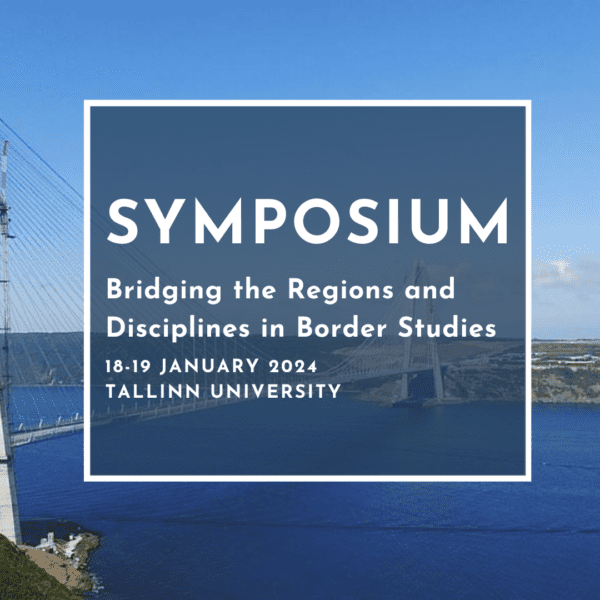
SYMPOSIUM INFORMATION
The Symposium Bridging the Regions and Disciplines in Border Studies will take place at Tallinn University, in Tallinn, Estonia on January 18-19, 2024.
SYMPOSIUM THEME
The study of borders in the social sciences and humanities is closely connected to ongoing socio- and geo-political processes, and since the 1990s, particular events are repeatedly listed as the source for reinvigorated scholarly interest in borders. These include the early trumpeting of a (neoliberal) borderless world demanding critical re-examination, the re- and de-bordering in Europe, the post 9/11 war on terror, and the immigration and refugee “crises” in Europe and the US. What is noticeable is how Western-centric such historical and political experiences feeding into border theories are, and how these theories largely ignore parallel developments in the Global South. Thus, an array of dynamic socio-political developments, from China’s Belt and Road Initiative (BRI) to India’s Act East Policy, or the perseverance of non-state spaces in many places in the world, remain marginal to the historical and intellectual genealogies of border studies.
This disconnection has important consequences. For example, when Anglo-American scholars ‘discovered’ the porosity of borders as something novel after the Cold War ended in Europe, many previously porous borders in Asia were witnessing more demarcation, militarization and state presence. Or, while today there are critical calls to shift research agendas from EU security-led re-bordering studies to also seeing borders as a resource, thriving Asian borderlands research has presented ample studies for a decade on creative ways of exploiting the opportunities that borders have generated. Thus, border-related themes of interest between Anglo-American and Asian scholarly research are out of sync, while it is difficult for the latter to penetrate the “mainstream” scholarship.
Our connected world demands a more global approach to understanding various forms and spaces of bordering, as we are likely to face more COVID-like epidemics and uncertainties resulting from climate change, the hasty advancement of new technologies, and enhanced mobilities and connectivities. We need more cross-fertilization of research not only across regions but also across disciplines to understand the unfolding of political and socio-cultural bordering in societies where borderwork has increasingly moved to multi-dimensional spaces – from skies and seas to various virtual domains. The aim of the symposium is thus to bridge the thriving regional and disciplinary scholarship in border studies to critically address unfolding global challenges.